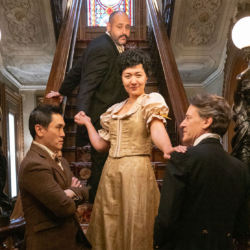While he’s a few hundred years younger than them, Sherlock Holmes has already gained the universality of a Shakespearean character. Holmes-ologists estimate that over 25,000 adaptations of his likeness and adventures have been produced since he first appeared in print in 1887.
This week, he comes to town in Sherlock Holmes: The Final Adventure at Portland Stage. Actors* Ezra Barnes, Brian Lee Huynh, and Isabelle Van Vleet perform the eternal core of Holmes, John Watson, and Irene Adler. They sat for a conversation over video right before their first rehearsal.
*All members of Actors’ Equity Association
MOLLY ADAMS: This is so exciting. I love Sherlock Holmes. Do you all love him?
ISABELLE VAN VLEET: I was a huge fan of the books, obviously, but also the modern BBC version with Benedict Cumberbatch.
BRIAN LEE HUYNH: I’ve seen that series twice, and I’ve probably watched the Guy Ritchie movies three or four times.
EZRA BARNES: I loved watching the Basil Rathbone films and when I was 11, my parents took me to see the Royal Shakespeare Company on Broadway with a Holmes production. An actor named John Wood was Holmes and it was astounding, you know, as a kid. It’s really where my formation as an actor began. And ended. [Laughs.] Can I be that graceful, that elegant, that incisive, that direct, that brilliant? You can be… but will I?
HUYNH: That’s why we do more than on show. [Laughs] Speaking of beginnings, I grew up on Munjoy Hill and moved to Gorham when I was 12. The first Shakespeare I did as a young person was A Midsummer Night’s Dream with the Maine Summer Dramatic Institute right here in the Forest Ave. building. So, it’s surreal coming back here as a professional and feeling just as excited to perform.
What’s getting you excited about the show as opening gets closer?

VAN VLEET: I had been living on the West End for the past two years and have dreamt of being on this stage. So that’s special for me. Then, it’s the costumes. Shireen (Unvala, costume designer) was showing me designs of gorgeous gowns, beautifully beaded with big bustles and long trains. I’ll be wearing a corset and new dress in almost every scene. There’s joy in playing a character who uses her femininity and her sexuality as power to create equal standing to her male counterparts in the late 19th century.
Shakespeare has come up a few times now and I’ll note that Ezra was a ten-year artistic director of Shakespeare on the Sound in Connecticut. What does it mean to work with characters or scripts that are public domain?
BARNES: I think it’s about the group that comes together to work on the play and how they do it. We always bring ourselves to work.
HUYNH: As an Asian American male, starting to work in the nineties, there was little written for someone like me, so I mostly did Shakespeare and other classics. They were the only way that I could get in there. Holmes is a classic because the stories have these universal values of humanity—love, friendship, morality, mortality—struggles everyone shares.
VAN VLEET: And I love that (director) Kevin R. Free has brought together an eclectic group of people to help surprise us with a classic story, but in the Kevin “I’m going to be wild” kind of way.
I hope this is a comedic script because you all have great chemistry just over Zoom.
BARNES: I would say it’s dangerously comedic. There are many funny things, but we must take it as seriously as possible. That’s where the emotional payoff comes. It’s just…. theater is fun! Often on stage, there’s a lot of drama, trauma. But a mystery, a thriller, it’s a celebration of life.

Comments are not available on this story. Read more about why we allow commenting on some stories and not on others.
We believe it's important to offer commenting on certain stories as a benefit to our readers. At its best, our comments sections can be a productive platform for readers to engage with our journalism, offer thoughts on coverage and issues, and drive conversation in a respectful, solutions-based way. It's a form of open discourse that can be useful to our community, public officials, journalists and others.
We do not enable comments on everything — exceptions include most crime stories, and coverage involving personal tragedy or sensitive issues that invite personal attacks instead of thoughtful discussion.
You can read more here about our commenting policy and terms of use. More information is also found on our FAQs.
Show less